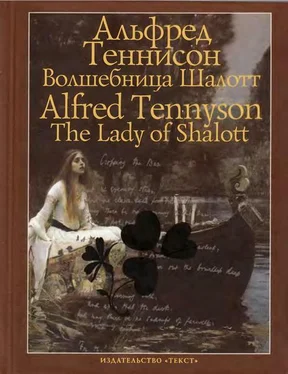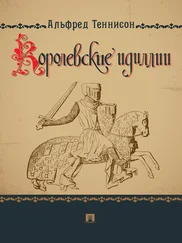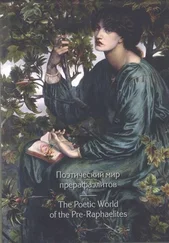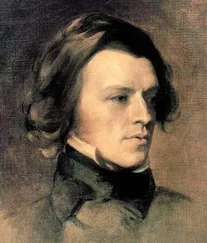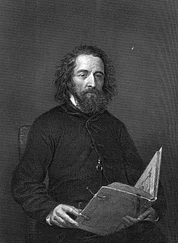The sparrow’s chirrup on the roof,
The slow clock ticking, and the sound
Which to the wooing wind aloof
The poplar made, did all confound
Her sense; but most she loathed the hour
When the thick-moted sunbeam lay
Athwart the chambers, and the day
Was sloping toward his western bower.
Then, said she, ‘I am very dreary,
He will not come’, she said;
She wept, ‘I am aweary, aweary,
Oh God, that I were dead!’
В усадьбе, обнесенной рвом…
Шекспир. Мера за меру
На клумбах мох как черный креп,
Аллеи глухи и мрачны,
И гвозди выпали из скреп,
Державших грушу у стены.
И в запустенье вековом
Строенья ветхие стоят,
Пустых окон тоскливый ряд —
На мызе, окруженной рвом.
«Как жизнь пуста! — она сказала. —
Он не придет и впредь.
А я устала, так устала,
Уж лучше умереть!»
На небе отгорел закат,
Рассыпался горстями рос.
Поднять не в силах скорбный взгляд,
Она лила потоки слез.
Мышей летучих вился рой,
И становилось все темней.
Закрывши окна, в мир теней
Она вошла ночной порой.
«Как ночь темна! — она сказала. —
Он не придет и впредь.
А я устала, так устала,
Уж лучше умереть!»
Она проснулась: на земле
Царила ночь, сойдя с высот.
Бык сонно замычал во мгле,
Выпь закричала средь болот.
Во сне она брела с трудом,
Сама не ведая куда.
Заря зажглась осколком льда
Над мызой, окруженной рвом.
«Как день тосклив! — она сказала. —
Он не придет и впредь.
А я устала, так устала,
Уж лучше умереть!»
Дремал под каменной стеной
Забытый, почерневший шлюз
И мох ползучей пеленой
Воды с землей скреплял союз.
Над шлюзом тополь-исполин
Стряхнул листву, коряв и гол.
На много миль лишь этот ствол
Торчал над пустошью трясин.
«Как жизнь пуста! — она сказала. —
Он не придет и впредь.
А я устала, так устала,
Уж лучше умереть!»
Когда всходила ввысь луна,
И ветер дул, и вечер гас,
На белой завеси окна
Тень тополя пускалась в пляс.
Но если ясной ночь была,
А ветры прекращали дуть,
То спящей на лицо и грудь
Ложилась тень, как вестник зла.
«Как ночь темна! — она сказала. —
Он не придет и впредь.
А я устала, так устала,
Уж лучше умереть!»
Влачился мирно скучный день.
Все было тихо, слышно лишь,
Как дверь скрипит, жужжит слепень,
Пищит под половицей мышь.
Но зов былого все властней
Звучал: то задрожит крыльцо,
То вдруг в окне мелькнет лицо
Из навсегда ушедших дней.
«Как жизнь пуста! — она сказала. —
Он не придет и впредь.
А я устала, так устала,
Уж лучше умереть!»
Со стенки — тиканье часов,
Гвалт воробьиный средь ветвей
И ветра заунывный зов —
Все было нестерпимо ей.
Но ненавистнее стократ
Тот час, когда тонул весь дом
В сиянье солнца золотом
И день клонился на закат.
«Как страшно мне! — она рыдала.
Он не придет и впредь.
А я устала, так устала!
Господь, дай умереть!»
М. Виноградова
PART I
On either side the river lie
Long fields of barley and of rye,
That clothe the wold and meet the sky;
And thro’ the field the road runs by
To many-tower’d Camelot;
And up and down the people go,
Gazing where the lilies blow
Round an island there below,
The island of Shalott.
Willows whiten, aspens quiver,
Little breezes dusk and shiver
Thro’ the wave that runs for ever
By the island in the river
Flowing down to Camelot.
Four grey walls, and four grey towers,
Overlook a space of flowers,
And the silent isle imbowers
The Lady of Shalott.
By the margin, willow-veil’d,
Slide the heavy barges trail’d
By slow horses; and unhail’d
The shallop flitteth silken-sail’d
Skimming down to Camelot:
But who hath seen her wave her hand?
Or at the casement seen her stand?
Or is she known in all the land,
The Lady of Shalott?
Only reapers, reaping early
In among the bearded barley,
Hear a song that echoes cheerly
From the river winding clearly,
Down to tower’d Camelot:
And by the moon the reaper weary,
Piling sheaves in uplands airy,
Listening, whispers ‘Tis the fairy
Lady of Shalott.’
PART II
There she weaves by night and day
A magic web with colours gay.
She has heard a whisper say,
A curse is on her if she stay
To look down to Camelot.
She knows not what the curse may be,
And so she weaveth steadily,
And little other care hath she,
The Lady of Shalott.
And moving thro’ a mirror clear
That hangs before her all the year’
Shadows of the world appear.
There she sees the highway near
Winding down to Camelot:
There the river eddy whirls,
And there the surly village-churls,
And the red cloaks of market girls,
Pass onward from Shalott.
Sometimes a troop of damsels glad,
An abbot on an ambling pad,
Sometimes a curly shepherd-lad,
Or long-hair’d page in crimson clad,
Goes by to tower’d Camelot;
And sometimes thro’ the mirror blue
The knights come riding two and two:
She hath no loyal knight and true,
The Lady of Shalott.
But in her web she still delights
To weave the mirror’s magic sights,
For often thro’ the silent nights
A funeral, with plumes and lights,
And music, went to Camelot:
Or when the moon was overhead,
Came two young lovers lately wed.
‘I am half sick of shadows,’ said
The Lady of Shalott.
PART III
A bow-shot from her bower-eaves,
He rode between the barley-sheaves,
The sun came dazzling thro’ the leaves,
And flamed upon the brazen greaves
Of bold Sir Lancelot.
A red-cross knight for ever kneel’d
To a lady in his shield,
That sparkled on the yellow field,
Beside remote Shalott.
Читать дальше
